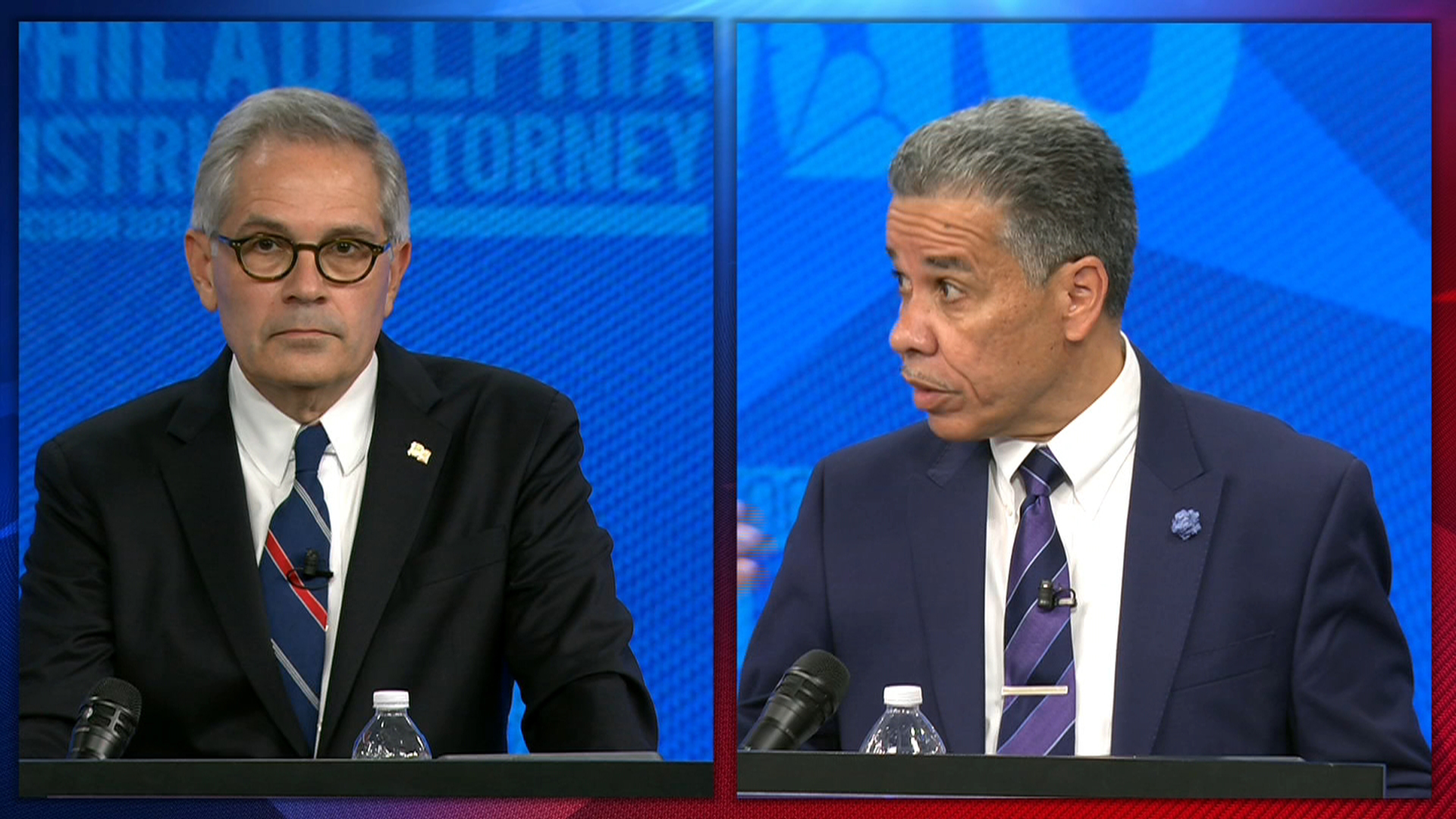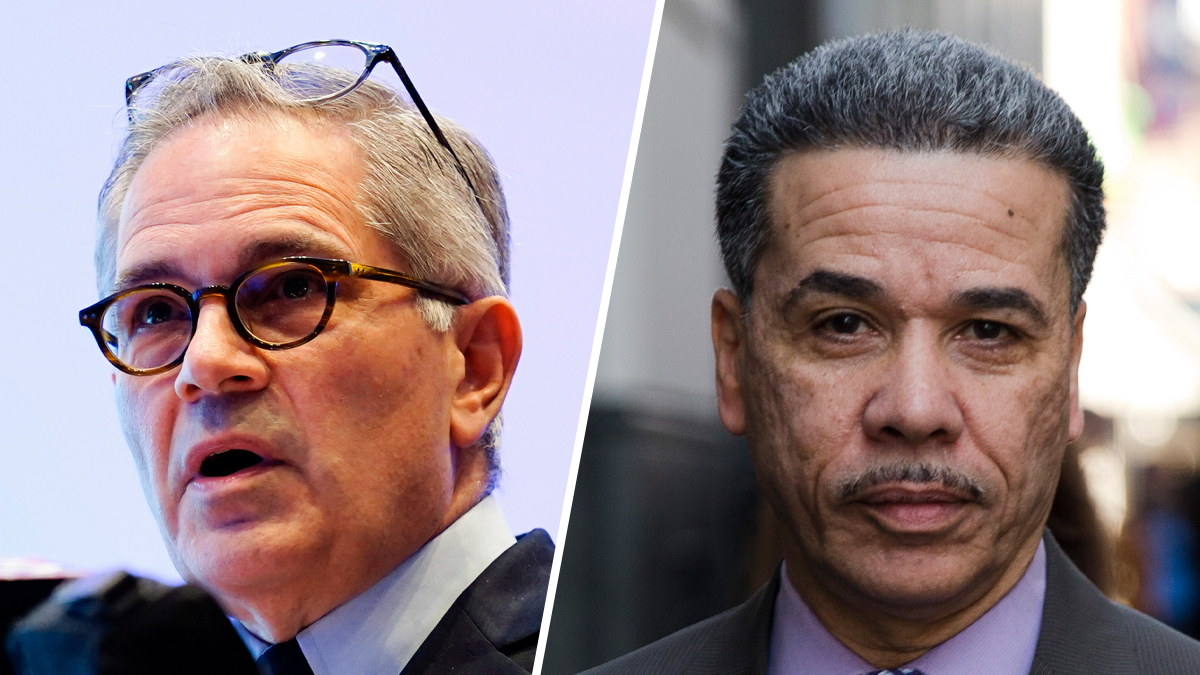Thousands of registered Republican voters in Philadelphia have switched parties and become Democrats since the beginning of the year, and the city police union has been taking credit for the large migration.
The Fraternal Order of Police claims they have been pushing the party change to help get their candidate in the May 18 district attorney's primary elected. The union backs Carlos Vega, a former city prosecutor who is challenging incumbent District Attorney Larry Krasner.
Only registered Democrats can vote in the primary, and the police union has put all of its resources into ousting Krasner, who has become a national figure in the criminal justice reform debate and is a strong supporter for more police accountability.
The exact number of Republicans who became Democrats since Jan. 1 is 6,252, according to the city commissioners' office. That's an increase of more than 200% compared to 2018 and 2020, combined, an election expert said.
Get top local stories in Philly delivered to you every morning. Sign up for NBC Philadelphia's News Headlines newsletter.
An NBC10 analysis of where those voters live gives some credence to the union's claims that it has undertaken a "get out the party switch" effort. (For those still considering switching parties to vote in the primary, please note: you missed the boat. The deadline to do so was Monday, May 3.)
Here is a map of Philadelphia's 66 political wards, and the number of voters per ward who changed parties. Wards with darker colors indicate a higher number of Republicans who became Democrats.
As the map shows, most of the Republicans who switched to the Democratic Party this year live in the Northeast section of the city. South Philadelphia Republicans also switched at a higher rate than GOP voters in other parts of the city.
Those sections of Philadelphia are traditionally home to many of the city's police officers. A few years ago, the FOP moved its union hall from Center City to the Far Northeast.
The high rate of party switching is the latest sign of a fight to the finish for Krasner and Vega, and a significant departure from previous elections.
In the previous two political cycles -- the 2020 presidential election and the 2018 mid-term election -- about 3,000 Republicans switched to Democrat in Philadelphia between Jan. 1 and the primary election, Berwood Yost, director of the Center for Opinion Research at Franklin & Marshall College, said this week. This year is a 200% increase over those previous elections combined.
Yost and other election experts said the party switching appears to be ignited by the political and social waves that Krasner created in his first term as DA. The former civil rights attorney who made a name by suing the Philadelphia police department vowed to reform longstanding institutions like cash bail, probation and juvenile incarceration.
He also rankled the police department, which for decades has worked hand-in-hand with the district attorney's office, by charging more than 50 officers with a range of offenses.
Vega, meanwhile, is a former assistant district attorney for 35 years who has vowed to continue some of Krasner's reforms while getting tougher on crime and working closer with police to make Philadelphia safer. He has received tens of thousands of dollars in campaign funding from the city and state police unions.
"It could make a difference if the race is going to be close," Yost said of the party switching. "However, the other side of this is the DA is a progressive candidate and there are a lot of progressive Democrats in the city. The party switches only matter if this is a close race."
It is hard, if not impossible, to predict whether the race is close or not. There have been no public polls conducted, and in an "off-off-election year" -- meaning there are no higher offices like mayor or Congress or president on the ballot -- turnout is hard to predict.
"I would be surprised if we didn’t have a higher turnout in the primary (this year) than in 2017 because this issue is so transparent and paramount," longtime polling expert Terry Madonna said of Krasner's reform agenda and the rise in gun violence in Philadelphia.
About 155,000 voters cast ballots in the DA primary in 2017, when Krasner beat out five other Democratic candidates to win his first term. That constituted about 22% of registered Democrats.
So far this year, 72,000 Democrats have requested mail-in ballots for the primary. That number is expected to grow before the May 11 deadline to apply for mail-in voting.
Last year, in Pennsylvania's first primary and general elections using universal mail-in voting, about 50% of Philadelphia voters cast ballots by mail, City Commissioner Al Schmidt said.
But he cautioned against using those elections in a presidential election year as a predictor for this year.
"It’ll be really interesting to see" the mail-in to in-person voting ratio in the primary, Schmidt said in estimating turnout in future elections.
Schmidt, a Republican, said that it is notable that the 6,200-plus Republicans who switched parties come from certain parts of the city. Center City Republicans, for instance, do not constitute many of the party switchers while switching was heaviest in Northeast Philly neighborhoods.
"We're not seeing much activity in Center City, where there are a lot of Republicans," Schmidt said.
He declined to predict what the party switching means for the outcome of the race between Krasner and Vega, but said supporters of both candidates appear to have reasons to be confident.
"We’ll see if the progressive trend continues in the city," Schmidt said of the movement that helped Krasner get elected. "In a low turnout election, it’s all about passion."
HOW TO VOTE IN MAY 18 PRIMARY: Registered Democrats in Philadelphia will be able to cast votes in the race between Vega and Krasner. The deadline to register to vote or to change your party designation was May 3. Voters can vote by mail or in person. Mail-in applications are due by May 11. CLICK HERE to apply.



